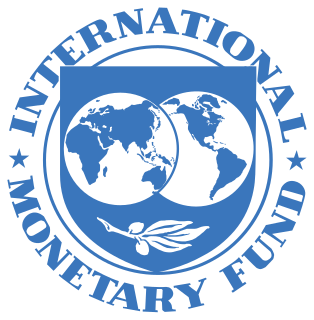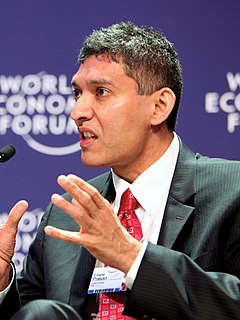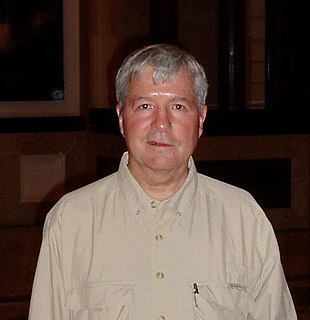
The International Monetary Fund (IMF) is a major financial agency of the United Nations, and an international financial institution, headquartered in Washington, D.C., consisting of 190 countries. Its stated mission is "working to foster global monetary cooperation, secure financial stability, facilitate international trade, promote high employment and sustainable economic growth, and reduce poverty around the world." Formed in 1944, started on 27 December 1945, at the Bretton Woods Conference primarily by the ideas of Harry Dexter White and John Maynard Keynes, it came into formal existence in 1945 with 29 member countries and the goal of reconstructing the international monetary system. It now plays a central role in the management of balance of payments difficulties and international financial crises. Countries contribute funds to a pool through a quota system from which countries experiencing balance of payments problems can borrow money. As of 2016, the fund had XDR 477 billion. The IMF is regarded as the global lender of last resort.

The Bank of Korea is the central bank of the Republic of Korea and issuer of Korean Republic won. It was established on 12 June 1950 in Seoul, South Korea.
Structural adjustment programs (SAPs) consist of loans provided by the International Monetary Fund (IMF) and the World Bank (WB) to countries that experience economic crises. Their purpose is to adjust the country's economic structure, improve international competitiveness, and restore its balance of payments.

The Intergovernmental Group of Twenty-Four on International Monetary Affairs and Development, or The Group of 24 (G-24) was established in 1971 as a chapter of the Group of 77 in order to help coordinate the positions of developing countries on international monetary and development finance issues, as well as and to ensure that their interests are adequately represented in negotiations on international monetary matters. Though originally named after the number of founding Member States, it now has 28 Members. Although the G-24 officially has 28 member countries, any member of the G-77 can join discussions.

Raghuram Govind Rajan is an Indian economist and the Katherine Dusak Miller Distinguished Service Professor of Finance at the University of Chicago Booth School of Business. Between 2003 and 2006 he was Chief Economist and director of research at the International Monetary Fund. From September 2013 through September 2016 he was the 23rd Governor of the Reserve Bank of India; in 2015, during his tenure at the RBI, he became the Vice-Chairman of the Bank for International Settlements.
Capital controls are residency-based measures such as transaction taxes, other limits, or outright prohibitions that a nation's government can use to regulate flows from capital markets into and out of the country's capital account. These measures may be economy-wide, sector-specific, or industry specific. They may apply to all flows, or may differentiate by type or duration of the flow.
James Raymond Vreeland is Professor of Politics and International Affairs in the Princeton School of Public and International Affairs and the Department of Politics at Princeton University. He conducts research in the field of international political economy, specializing in international institutions.
Malcolm D. Knight is a Canadian economist, policymaker and banker. He is currently Visiting Professor of Finance at the London School of Economics and Political Science and a Distinguished Fellow at the Center for International Governance Innovation. From 2008 to 2012, Knight was Vice Chairman of Deutsche Bank Group where he was responsible for developing and coordinating the bank's global approach to issues in financial regulation, supervision, and financial stability. He served as general manager of the Bank for International Settlements from 2003 to 2008 and as Senior Deputy Governor of the Bank of Canada (1999-2003), after holding senior positions at the International Monetary Fund (1975-1999).

Eswar Shanker Prasad is an Indian-American economist. He is the Tolani Senior Professor of International Trade Policy at Cornell University and a senior fellow at the Brookings Institution, where he holds the New Century Chair in Economics.

Arvind Panagariya is an Indian-American economist who is the Jagdish Bhagwati Professor of Indian Political Economy at Columbia University and is also the Director of Deepak and Neera Raj Center on Indian Economic Policies at School of International and Public Affairs at Columbia University in New York City. He served as first vice-chairman of the government of India think-tank NITI Aayog between January 2015 and August 2017. He is a former Chief Economist of the Asian Development Bank. He was awarded the Padma Bhushan by the President of India in 2012 for his contributions in the field of economics and Public Policy.

Stijn Claessens is a Dutch economist who currently serves as the Head of Financial Stability Policy department of the Bank for International Settlements. He worked for fourteen years at World Bank beginning in 1987 until 2001 where he assumed various positions including that of Lead Economist. Following his tenure at the World Bank he became Professor of International Finance Policy at the University of Amsterdam where he remained for three years and still is on the faculty. Stijn has many distinguished academic publications and his work has been cited in many outlets including The Wall Street Journal, The Financial Times, The Economist, The Washington Post and various other publications and he has appeared in several television programs.

Stephany Griffith-Jones is an economist specialising in international finance and development, with emphasis on reform of the international financial system, specifically in relation to financial regulation, global governance and international capital flows. She is currently member of the Governor Board at the Central Bank of Chile. She has been financial markets director at the Initiative for Policy Dialogue, based at Columbia University in New York and associate fellow at the Overseas Development Institute. Previously she was professorial fellow at the Institute of Development Studies at Sussex University. She has held the position of deputy director of International Finance at the Commonwealth Secretariat and has worked at the United Nations Department of Economic and Social Affairs and in the United Nations Economic Commission for Latin America and the Caribbean. She started her career in 1970 at the Central Bank of Chile. Before joining the Institute of Development Studies, she worked at Barclays Bank International in the UK. She has acted as senior consultant to governments in Eastern Europe and Latin America and to many international agencies, including the World Bank, the Inter-American Development Bank, the European Commission, UNICEF, UNDP and United Nations Conference on Trade and Development. She was also a member of the Warwick Commission on international financial reform. She has published over 20 books and written many scholarly and journalistic articles. Her latest book, edited jointly with José Antonio Ocampo and Joseph Stiglitz, Time for the Visible Hand, Lessons from the 2008 crisis, was published in 2010.

Warren L. Coats, Jr., is an economist specializing in monetary policy. He retired from the International Monetary Fund in May 2003 to join the board of directors of the Cayman Islands Monetary Authority. He is president of Economic Consulting, providing technical assistance to central banks, and until recently was adviser to the central banks of Afghanistan and Kazakhstan.
Emmanuel Farhi was a French economist and professor of economics at Harvard University. His research focused on macroeconomics, taxation and finance. He was a member of the French Economic Analysis Council to the French Prime Minister from 2010 to 2012.

Nicoletta Batini is an Italian economist, notable as a scholar of innovative monetary and fiscal policy practices. During the crisis she pioneered the IMF work exposing the dangers of excessive fiscal austerity and designed ways to consolidate public debt successfully during phases of financial deleveraging. Since 2003 at the International Monetary Fund, she has served as Advisor of the Bank of England’s Monetary Policy Committee between 2000-2003 and was Professor of Economics at the University of Surrey (2007-2012), and Director of the International Economics and Policy office of the Department of the Treasury of Italy’s Ministero dell’Economia e delle Finanze (MEF) between 2013-2015. Batini's fields of expertise include monetary policy, public finance, open economy macroeconomics, labor economics, energy and environmental economics, and economic modeling. She has handled extensive consultancy roles in the public sector in advanced and emerging market countries. She holds a Ph.D. in international finance from the Scuola Superiore S. Anna and a Ph.D. in monetary economics from the University of Oxford.
Connel Fullenkamp is an economist and the Director of Undergraduate Studies and Professor of the Practice in economics at Duke University, where he teaches core economics and financial economics courses. In addition to his work at Duke University, he consults for the IMF Institute for Capacity Development at the International Monetary Fund. As a member of the IMF's finance team, he trains government officials and central bankers in financial market regulation, with a focus on derivatives and emerging financial instruments. He has also collaborated with The Great Courses to produce several lecture series on economics and investing and consults for The New York Times as a faculty contributor to the NYT in Education courses in microeconomics and macroeconomics.
The external debt of India is the total debt the country owes to foreign creditors. The debtors can be the Union government, state governments, corporations or citizens of India. The debt includes money owed to private commercial banks, foreign governments, or international financial institutions such as the International Monetary Fund (IMF) and World Bank.
Enrica Detragiache is the head of the Germany Desk of the International Monetary Fund (IMF), and the assistant director of the IMF's European division. She formerly taught Economics at Johns Hopkins University, and has published over 71 research papers and articles. Her research covers topics such as labour migration, financial crises, development economics, and corporate finance.









